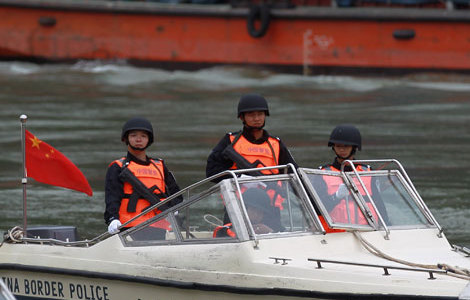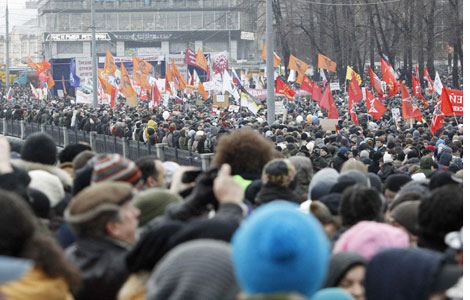Opening up - China's answer to the past and future
Updated: 2011-12-11 08:13
(Xinhua)
|
|||||||||||
BEIJING - While China is steering through spectacular yet complicated economic transformation during which ideas clash and wrangle, there is little debate that an open and market-based economy with esteem for laws and rules are the cornerstone of its past miracle and the elixir of future prosperity.
Sunday marks the 10th anniversary of China's accession to the World Trade Organization (WTO). Membership of this trade club, materially, catalyzes China's ascent to the world's second largest economy and a trading powerhouse; and physiologically entrenches the notion of fair play and free market into people's awareness.
The 15-year-negotiation before China's entry, then dubbed a marathon at home, has paid off and manifested the country's determination to embrace common standards and better integrate with the world. After tasting the fruits of two decades of phenomenal growth due to opening up and reform, China's policymakers knew opening further to the outside and moving toward a free, open and transparent market was the answer to a future of economic boom.
To honor its WTO commitments, China slashed the average tariff from 15.3 percent to 9.8 percent, imported goods worth $750 billion annually, which created at least 14 million jobs for other economies, opened up 100 different areas of the service sector, and rectified more than 3,000 obsolete laws and regulations to adapt to international norms.
Foreign companies also reaped unparalleled benefits from China. In the past ten years, nearly 350,000 foreign-funded companies were set up in China, generating profits of $261.7 billion, representing a blistering annual growth of 30 percent.
Foreign consumers shared the boon. Affordable Chinese goods saved US consumers $600 billion, and 300 euros for a family each year in the European Union (EU).
Deeper opening up and interaction lead to more understanding, and also more friction. The low-priced Chinese-made products were blamed for hastening the decline of manufacturing in Western economies and undercutting their jobs. China has become the primary victim in trade remedy probes -- of which exporters have grown accustomed to -- and a regular target in presidential campaigns in some Western countries.
With countries scrambling to boost trade to reignite growth amid a gloomy outlook, more intense trade friction would not be surprising. Ten years of WTO membership makes China understand that mature trade relations could settle disputes through dialogue and negotiation, while the abuse of protectionist moves only avert short-run risks, but foster long-term perils.
Therefore, China has the rights and ability of safeguarding its due interests under the WTO framework.
While nations continue to benefit from China's breakneck growth and lucrative market, they fret about smaller profit margin and unjustifiably attribute it to China's slowing pace of opening up, less transparent governance, weaker law enforcement and more discrimination against foreign investors.
It is true that foreign companies grapple with higher operation costs in China, as the government has phased out of a series of favorable policies exclusively designed for them 30 years ago. But that only levels the playing field with domestic peers. It is unrealistic for one to expect others' favor would persist for good without sound reasons.
China remains open and welcome foreign investment and trade, but in a different way which emphasizes on cooperation in the upper reaches of the food chain, other than low-added value ties.
All of these should not be interpreted as less opening and less friendly policies, but should be a more advanced and more effective means.
Admittedly, China has room to open up further and to lessen the government's grip on parts of the economy, but that could hardly be the evidence that China has suffered a setback in opening up and reform, which would run against WTO norms of cultivating open, liberalized, and transparent economies, and is also a denial of China's development path over the past three decades.
Ten years ago China worried about being squeezed off by the coming foreign competitors. Ten years on, fears have gone. It has accumulated more resources and become more confident in confronting tougher tests.
Treating China as a benign partner other than an aggressive adversary is a wise and rational mind-set that will lead to further mutual benefits.
China has developed a clear-cut orientation on its way to improve market economy, but its pace and intensity is decided by varied conditions. Opening up does not stand for bottomless concessions given its developing country status, which are spelled out in its WTO commitments. That is part of the game that every player has to respect.
As an old saying goes: more haste, less speed. China has made impressive steps to bring its laws and regulations into line with global rules, however, over-speedy moves could lead to big fluctuations and economic disorders, making the whole environment unfavorable for both domestic peoples and foreign investors amid China's complicated economic and social environment.
Venting anger on issues such as foreign ownership restrictions, incomplete market openings, inadequate protection of intellectual property rights, and even government decision-making schemes, without considering China's improving efforts and its unique historical background and national conditions, would be impetuous and meaningless.
Compared with hundreds of years of market economy practice in Western developed countries, China's brief thirty-year experience is far from rich enough.
As what China implements is the market economy with Chinese characteristics, it suggests two points: China respects the basic elements and rules of a market economy, but it also has the initiatives to map out the details based on its unique conditions.
The ten-year anniversary of WTO accession offers China a fresh start to embrace more opening up within WTO rules and its own capacity.
Hot Topics
HIV/AIDS, Egypt protest, Thanksgiving, climate change, global economic recovery, home prices, high-speed railways, school bus safety, Libya situation, Weekly photos
Editor's Picks

|

|

|

|

|

|







